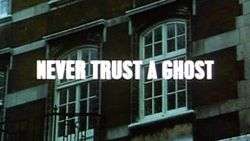Never Trust a Ghost
"Never Trust a Ghost" is the fourth episode of the 1969 ITC British television series Randall and Hopkirk (Deceased) starring Mike Pratt, Kenneth Cope and Annette Andre. The episode was first broadcast on 12 October 1969 on ITV. Directed by Jeremy Summers.
| "Never Trust a Ghost" | |
|---|---|
| Randall and Hopkirk (Deceased) episode | |
 | |
| Episode no. | Season 1 Episode 4 |
| Directed by | Jeremy Summers |
| Written by | Donald James |
| Production code | 04 |
| Original air date | 12 October 1969 |
| Guest appearance(s) | |
Synopsis
Cast
- Mike Pratt as Jeff Randall
- Kenneth Cope as Marty Hopkirk
- Annette Andre as Jeannie Hopkirk
- Philip Madoc .... Rawlins
- Peter Vaughan .... James Howarth
- Edina Ronay .... Sandra
- Caroline Blakiston .... Karen Howarth
- Donald Morley .... Inspector Clayton
- Brian Oulton .... Dr. Plevitt
Production
Although the 4th episode in the series, Never Trust a Ghost was the 14th episode to be shot, filmed between December 1968 and February 1969.[1]
A small amount of location shooting was done for this episode: the exterior of Jeff's apartment on St Johns Wood High Street, where Jeff is seen arriving in act one, Jeannie arriving by mini and the arrival of the police car with Inspector Clayton in act two. When Jeff drives back from his visit with Dr Plevitt, exterior footage of the Vauxhall was shot on Great Chapel Street and Oxford Street. Second-unit footage of the exterior and street of Adams Furniture in Harrow for the sequence showing Jeff driving back to the Randall & Hopkirk office in the Vauxhall and being shot at by Rawlins, who then drives off.
Back projection footage seen behind Jeff and Marty in the studio shot car interiors consisted of footage of Goodge Street, Charlotte Street, Tottenham Court Road and Howland Street. Stock footage depicting London at night at the start of the episode consisted of shots of Berkely Street, Lambeth Pier and the Houses of Parliament. Stock shots of New Scotland Yard and the British Museum were also used. The street and exterior of Howarth's home were shot on the standing street sets on the backlot at Elstree studios.
References
- "Programmes". Randallandhopkirk.org.uk. Retrieved 8 April 2014.
External links
- "Never Trust a Ghost" on IMDb
- Episode overview at Randallandhopkirk.org.uk
- Filming locations at Randallandhopkirk.org.uk